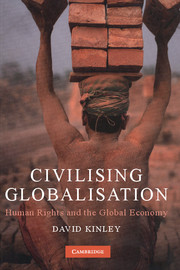4 - Commerce and human rights
Published online by Cambridge University Press: 05 June 2012
Summary
Introduction
In the year of this book's publication, the worst corporate calamity of modern times will mark its twenty-fifth anniversary. Around midnight on 2–3 December 1984, a dense cloud of 40 tons of highly poisonous methyl isocyanate (MIC) gas drenched the Indian city of Bhopal, after a catastrophic chemical reaction occurred in a holding tank at the nearby pesticide plant operated by the Indian subsidiary of the US firm Union Carbide. More than 3,000 people died in the immediate aftermath, according to official figures (though many civil society organisations put the figure at almost three times that number), and more than 50,000 people were permanently disabled. In the following weeks a further 15,000 died as a direct consequence of the leak, and it has been estimated that since then approximately the same number have died for reasons that included exposure to the gas, drinking contaminated water or consuming produce from contaminated soil. Recent reports on the medical consequences of the disaster show an intergenerational impact with clear evidence of birth and developmental abnormalities that correlate to those who, though exposed to the gas, survived, and have since had children.
Despite the intense worldwide media interest in the tragedy, and the string of court cases it spawned, it remains unclear precisely what caused the water to enter the holding tank that set off the chain of events leading to the gas leak, but many believe it was due to the chronic disrepair of the plant's infrastructure, while the company claims it might have been the work of a saboteur.
Information
- Type
- Chapter
- Information
- Civilising GlobalisationHuman Rights and the Global Economy, pp. 145 - 203Publisher: Cambridge University PressPrint publication year: 2009
